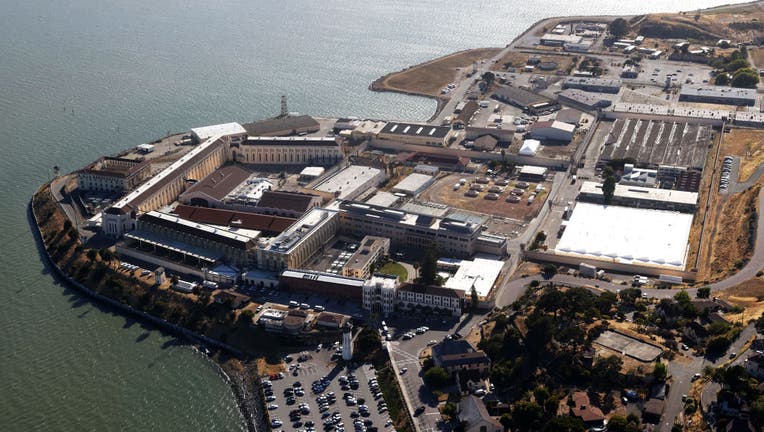San Quentin could experience more surges of coronavirus cases, attorneys say

SAN QUENTIN, CALIFORNIA - JULY 08: An aerial view San Quentin State Prison on July 08, 2020 in San Quentin, California. Over 1,400 inmates and staff at San Quentin State Prison have become infected with coronavirus COVID-19 after inmates from a Chino (Getty Images)
SAN QUENTIN, Calif. - San Quentin may "very well experience a second, or even a third surge" in coronavirus cases if more incarcerated people are not released soon, lawyers on behalf of 300 people in custody argued in court papers on Tuesday.
"Every day of delay increases that likelihood," wrote the team of attorneys, who hail from the San Francisco, Alameda County and Marin County Public Defender's Offices as well as the private firm. Keker, Van Nest & Peters in San Francisco. team of lawyers
With that fear in mind, the attorneys implored Superior Court Judge Geoffrey Howard to hold an evidentiary hearing on the matter, so that they can argue what they see as the most reasonable remedy: Release hundreds of incarcerated people from San Quentin while prioritizing the needs of those older than 60, those who have served 25 years of their sentences, those who are eligible for parole and those who are at high medical risk.
Lisa Strawn, 61, was released from San Quentin in July. She was also diagnosed with COVID-19 when she was there.
"I didn't think I would make it out after 25 years," she told KTVU. "Now I've been through a lot. But nothing compares to getting COVID-19. I still have issues of taste and smell and the psychological after-effects are still there. Not enough was done then to protect us all. You simply can't keep moving people around."
The attorneys' habeas corpus request comes after an Oct. 21 ruling by the First District Court of Appeal, which found conditions of "deliberate indifference" at San Quentin, and the deadly outbreak virus there as the "worst epidemiological disaster in California correctional history." The appeals court ruled that 1,100 incarcerated people either had to be released or transferred from San Quentin in an expeditious manner.
And the court allowed the California Department of Corrections and Rehabilitation to figure out how to thin out the population of San Quentin by half, though no date was set to when that would be.
- Formerly incarcerated Emeryville man explains why many at San Quentin don't want to be transferred
- Appeals court orders San Quentin to reduce population citing 'deliberate indifference' over virus
- Lawyers for nearly 50 men incarcerated at San Quentin sue over 'botched transfer,' demand release
The CDCR didn't agree with the ruling, spokeswoman Dana Simas said. And the agency has not yet formally announced what the prison system would do about the order. The Attorney General, who is representing CDCR, has until Nov. 16 to reply.
Attorneys for the incarcerated men argued in court papers that "mass transfers will not work," and they cited the transfer from a prison in Chino to San Quentin in May that cause the first outbreak in San Quentin, where so far, 28 inmates have died.
A new transfer of 1,100 incarcerated people at San Quentin - the number the appeals court identified - will likely lead to more infection and death, the attorneys argued.
"It strains credulity" to believe that CDCR could safely transfer this many people without further harm to those at San Quentin and to other prisons, the inmates' attorneys argued. To date, California prisons are still at 105% capacity; 13 of which are at 120% capacity.
The attorneys cited a deposition taken of Dr. Joseph Bick, the prison's director of healthcare services, who said that CDCR should limit all unnecessary movement.
"Don't transfer people unless you absolutely have to," Bick testified. "Consider all other options first."
Lisa Fernandez is a reporter for KTVU. Email Lisa at lisa.fernandez@foxtv.com or call her at (510) 874-0139. Or follow her on Twitter @ljfernandez.

